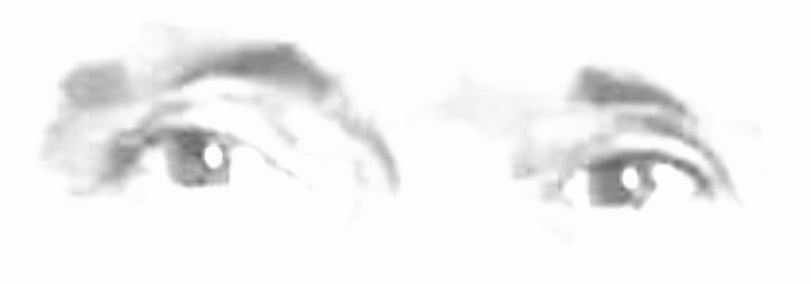R+: the gaze+
Well beyond limits
Empathy is probably the most advanced way to know or understand another being or person. Some animals seem to be gifted with this faculty. This presupposes the ability to go beyond ourselves, and to dive, to live in another being. Is this possible? Or do we only imagine what the other feels by referring to our own experiences?
This represents a threshold.
This represents a threshold.
the Activity to Understand and Know
The human being is a double being, and even triple, if one wants. But double because he is for a large part "physical", such as he presents himself to the immediate observation in most of his manifestations. This physical part being very obvious, another part, more subtle, is often as if eclipsed. However, this eclipsed part is not the least, because it plays a role in the foreground of who we are and what we do. This less visible part could be identified as the "inner world". It is a world that is all the more invisible, as it is assimilated to the brain, the hormonal system, etc., because by this association with the brain, it loses all value for direct observation. This is where many controversies come from, since everyone can, at least, only observe his own. Especially also that this interior world, and what it contains, easily escapes the glance. And this all the more, since this exercise of interior observation is unfortunately not part of the general culture. Obviously, everyone does it, this inner observation, since without it, we could neither think, nor feel, nor want. To think, for example, we must perceive our thoughts, even if this perception escapes us in some way, because without this perception, we would be absolutely unconscious of our thoughts. And this very perception of the thoughts escapes us, by the simple fact that we are generally not interested by the thinking activity itself, - because there must be a thought-producing activity, the poor nervous cells not being able to do it -, but rather by its result, by its final product, which is the thought. Thought is obviously used a lot, because without it, there would be no sciences, nor any applications, therefore neither engineering, nor even technology, nor civilization in general.
Move an arm, and it is the inner world that is involved. Everything takes place there, in this inner world, its source. Even a reflex, which would seem to be actuated only by an external cause, still passes through this interior. But as this inner world is absolutely unobserved, its extent and properties are currently almost unknown. The implication of the inner world in for example the slightest gesture, escapes consequently beyond the observation, only because this one does not apply to it.
Not to know, by direct observation, this inner world, has implications for the knowledge itself, which obviously takes place in this inner world. The knowledge of the world is affected by this, and a distortion in our understanding of the world is insinuated. On the one hand, this is because we rely to a great extent on all sorts of instruments to "know" the world, which can only send us data about this world in their own image, i.e. of a mechanistic nature. And on the other hand because the different substances present in the world are all identified as being "material", giving the impression that we live in a material world, it does not seem possible to identify so-called spiritual substances, which not so long ago would have left a place for attributes such as consciousness etc. As our culture has not developed a way to observe the substance of our consciousness, it is very easy to misunderstand many things, leading for example to the very general impression that consciousness is the product of matter. Numerous inversions of the kind are thus committed, where one reverses cause and effect, thus where one puts the cart before the horse.Pourtant, l'observation directe peut, avec un peu de pratique, arriver à observer, dans le monde intérieur, la substance de la conscience, la substance de la pensée, la substance des émotions, la substance du regard intérieur, etc. Les implications pratiques de ce qui en découlent sont énormes, et non la moindre est le bouleversement de la conception du monde régnante. Cela aurait des implications pour la vie sociale, puisque surtout dans le domaine économique il deviendrait évident à quel point là aussi on inverse cause et effets. Il s'en suivrait donc un assainissement de la vie sociale et économique, en fait toute la structure de la société en serait affectée, y compris la structure étatique.
But not the least of the consequences would be towards the youth, who would finally see themselves perceived and understood, since there the double aspect of the human nature still manifests itself with great preponderance. This would lead to a reorganization of the educational system, from which other pedagogical measures would become possible.
Move an arm, and it is the inner world that is involved. Everything takes place there, in this inner world, its source. Even a reflex, which would seem to be actuated only by an external cause, still passes through this interior. But as this inner world is absolutely unobserved, its extent and properties are currently almost unknown. The implication of the inner world in for example the slightest gesture, escapes consequently beyond the observation, only because this one does not apply to it.
Not to know, by direct observation, this inner world, has implications for the knowledge itself, which obviously takes place in this inner world. The knowledge of the world is affected by this, and a distortion in our understanding of the world is insinuated. On the one hand, this is because we rely to a great extent on all sorts of instruments to "know" the world, which can only send us data about this world in their own image, i.e. of a mechanistic nature. And on the other hand because the different substances present in the world are all identified as being "material", giving the impression that we live in a material world, it does not seem possible to identify so-called spiritual substances, which not so long ago would have left a place for attributes such as consciousness etc. As our culture has not developed a way to observe the substance of our consciousness, it is very easy to misunderstand many things, leading for example to the very general impression that consciousness is the product of matter. Numerous inversions of the kind are thus committed, where one reverses cause and effect, thus where one puts the cart before the horse.Pourtant, l'observation directe peut, avec un peu de pratique, arriver à observer, dans le monde intérieur, la substance de la conscience, la substance de la pensée, la substance des émotions, la substance du regard intérieur, etc. Les implications pratiques de ce qui en découlent sont énormes, et non la moindre est le bouleversement de la conception du monde régnante. Cela aurait des implications pour la vie sociale, puisque surtout dans le domaine économique il deviendrait évident à quel point là aussi on inverse cause et effets. Il s'en suivrait donc un assainissement de la vie sociale et économique, en fait toute la structure de la société en serait affectée, y compris la structure étatique.
But not the least of the consequences would be towards the youth, who would finally see themselves perceived and understood, since there the double aspect of the human nature still manifests itself with great preponderance. This would lead to a reorganization of the educational system, from which other pedagogical measures would become possible.
R+, a gaze, with regards
What do we know about knowing, if knowing does not know itself? Since knowledge is highly prized, what about knowledge itself? What is knowledge? Is it an operation of the brain? Is it a fact? Can we observe the act of knowing? Can the inner world be observed? Or is it only analyzed? We will go to the observation of the inner facts, which, like objects of the external world, reveal themselves, to the observation, endowed with quite astonishing properties. The key to understanding the world is there. Finally, we will be able to approach the world with the respect that is due to it. The children will see themselves recognized, understood. And we will be able to create a society that offers them the space for growth that they need.






